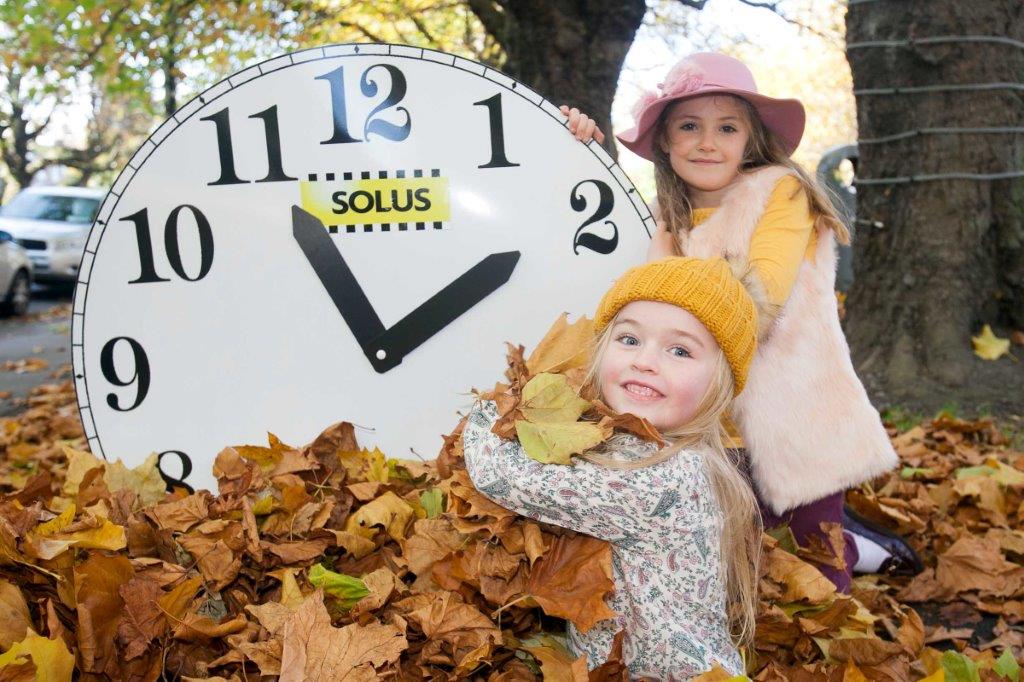Solus Survey reveals that 65% of Irish people are not in favour of ‘daylight saving’ as clocks go back on October 25th
Coldplay great-great-grandfather behind extra hour in bed!
When William Lillet, great-great-grandfather of Coldplay’s Chris Martin, first introduced the concept of ‘daylight saving’ in 1907, it was very controversial. According to a new survey carried out by leading Irish lighting company Solus, is just as contentious today! The survey has revealed that 65% of Irish people would rather if the clocks did not change this weekend. 54% spend the extra hour in bed, 14% get out and embrace the day whilst 4% are blissfully unaware or wonder if there has been a zombie apocalypse! The vast majority believe that the reason the clocks go back is for some form of daylight saving although there was that 1% that believe it was brought in because De Valera wanted people to be able to dance at the crossroads…
When asked how they will spend the extra hour, the majority of respondents (54%) stay in bed, 10% have a long leisurely breakfast, 14% get out and embrace the day and 9% stay out extra late on Saturday night so they can take advantage of the extra hour to snooze on Sunday morning. 9% won’t remember until they are already up and out of the house and 4% will wander through empty streets wondering if there has been a zombie apocalypse!
When asked why the clocks go back, 82% of respondents cited day light saving to benefit school children, farmers and community. 2% believe it is just tradition, 4% believe it is to save energy, 7% said it signals the end of summer (what summer!), 4% believe it is because the practice is adopted by most of Europe and 1% blamed De Valera and his vision for Ireland dancing at the crossroads!
Whether we like it or not, on Sunday October 25th at 2am the clocks go back, making mornings slightly lighter and evenings darker. Interestingly, the whole concept of daylight saving was actually introduced in 1907 by the great-great-grandfather of Coldplay singer Chris Martin! William Lillet published a pamphlet called ‘The Waste of Daylight’ in a bid to get people out of bed earlier by changing the nation’s clocks. Willett then spent the rest of his life trying to convince people his scheme was a good one. Sadly, he died of influenza in 1915 at the age of 58; a year before his clock-changing plan was adopted by the Germans and the UK in 1916. His great-great grandson, Chris Martin however has had huge success with smash hits ‘Clocks’ and ‘Daylight’ perhaps inspired by his forefather!
There are currently about 70 countries that participate in Daylight Saving Time, though not necessarily on the same schedule as Ireland. Ireland is located in the Greenwich Mean Time zone, sharing the same time as Great Britain, Iceland, Portugal, and some countries in northwest Africa. In Ireland, the maximum 17 hours of sunlight – on the longest day in June (the summer solstice) – dwindles to just seven hours and 30 minutes six months later in December (the winter solstice). The Solus survey reveals that almost 70% of respondents still have old incandescent light bulbs in their homes and 66% believe they have less than 50 light fittings in their houses even though the average 3 bed semi detached house actually has over 75 light fittings! 78% of those surveyed were aware of the exact date that the clocks go back this month and the vast majority know the reasons why so we seem to be quite knowledgeable on daylight saving but energy saving is not our strongest subject!
As the evenings get darker we have some top energy saving tips from Solus:
- The EU started the phase out of ordinary incandescent bulbs in September 2009 and production ceased in 2012 yet there are still many homes in Ireland that have these inefficient light bulbs hiking up their energy costs. The old (incandescent) bulbs are very wasteful as 90% of the electricity they use produces heat rather than light. Energy efficient alternatives not only save money on electricity bills but also help to protect the environment. It is a good idea to check all bulbs in use and stocks of light bulbs and start changing now as the savings will more than pay for the replacement costs.
- Turn the lights off when leaving a room and use “task” lighting rather than whole room lighting when only a small amount of light is required. Regularly clean light fittings, reflectors and lampshades.
- Most energy efficient light bulbs, such as Compact Fluorescent Lamps (CFLs) and halogen light bulbs, are available in various configurations and although they cost more to purchase, they are far more energy efficient thus reducing electricity costs. For example, a CFL light bulb uses 80% less electricity than an equivalent incandescent light bulb and typically lasts eight to twelve times longer.
- Replacing 3 x 100W incandescent light bulbs with CFLs using 3 hours of electricity per day can save an average household up to €43 per annum.
- Outdoor flood lights look great especially when they are lighting up trees or garden features. However, it might be worth considering only switching them on occasionally to help reduce your energy bill.
Solus is an Irish owned company that has been established for over eighty years and now supports 63 jobs in Ireland. The company is constantly investing in new product development and the manufacturing and application of innovative lighting solutions including next generation LEDs. Solus is committed to providing a complete range of energy saving lighting products for all applications possible. This has enabled consumers to be confident in knowing that they can rely on Solus to supply their lighting needs well into the future at competitive prices.
ENDS






